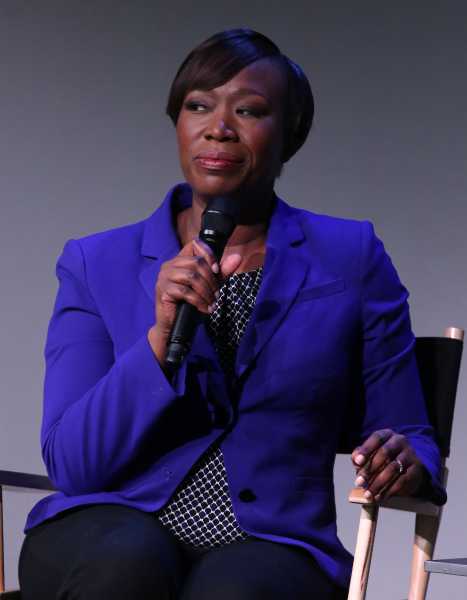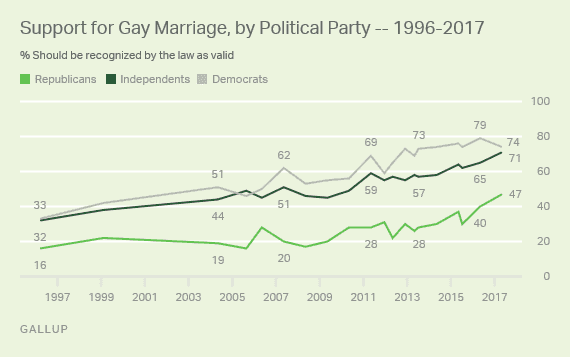
Joy-Ann Reid is, depending on who you believe, either the victim of an elaborate hack or someone with a long history of homophobic remarks.
The host of MSNBC’s weekend show AM Joy has been under fire in recent days for newly uncovered blog posts posted on Reid’s now-defunct blog, the Reid Report, in the mid-to late 2000s that repeatedly mocked gay people and specific individuals who were allegedly gay.
The posts, for example, suggested — without much, if any, evidence — that Tom Cruise, Karl Rove, and Chief Justice John Robert’s son are gay. Other posts made derogatory remarks about gay people, claiming that “most straight people cringe at the sight of two men kissing” and that “adult gay men tend to be attracted to very young, post-pubescent types.” One post acknowledged, “Does that make me homophobic? Probably.”
These are different from previous blog posts that Reid apologized for in December 2017. In those past posts, Reid wrote that then-Florida Gov. Charlie Crist was gay, nicknamed him “Miss Charlie,” and claimed that he only married a woman for political purposes. Reid said her comments were “insensitive, tone-deaf and dumb. There is no excusing it — not based on the taste-skewing mores of talk radio or the then-blogosphere, and not based on my intentions.” Crist, who’s now a member of Congress, accepted her apology.
Instead of apologizing for the blog posts that were recently resurfaced, though, Reid has denied that she posted them altogether. In a statement to Mediate, Reid said that the blog posts were the work of hackers and “part of an effort to taint my character with false information by distorting a blog that ended a decade ago.”
There’s reason to be skeptical of the claim. For one, the blog posts were archived by internet crawlers and, in those archives, really dated to the mid-to-late 2000s — a time when Reid wasn’t an MSNBC host or even a widely known national figure, raising questions about why someone would bother hacking her. Reid also hasn’t supplied evidence for her claims of a hack. This has helped elevate the controversy further, as even some of Reid’s supporters have questioned why she didn’t just apologize instead of making assertions that many find literally unbelievable.
As with many things in modern American life, this has also been highly politicized. Reid has become a major target of the left due to her criticisms of Sen. Bernie Sanders (I-VT) during his bid against Hillary Clinton for the Democratic presidential nomination in 2016, as well as conservatives due to her criticisms of President Donald Trump. Many of these critics have leveraged the current situation to try to end Reid’s career, while those who agree with her political positions have become some of her biggest defenders.
To understand how we got to this point, though, let’s start with the original blog posts.
What the old blog posts on Reid’s site said
Twitter user @Jamie_Maz uncovered the original blog posts about Crist in November 2017.
On April 18, @Jamie_Maz followed on that first discovery with a much bigger reveal — one that, according to @Jamie_Maz, showed “Joy Reid’s homophobic blog posts were far worse than 1st reported.”
The thread for these blog posts is very, very long — spanning 48 tweets. But there are some common themes.
First, the blog posts were very focused on outing people who weren’t publicly gay at the time or not gay at all. The posts’ targets ranged from celebrities and politicians to political operatives and pundits to the children of political figures. Here are a few examples:
A few of the posts didn’t appear to actually accuse people of being gay, but instead used homosexuality as a punchline and insult to criticize political figures and pundits:
Some of the blog posts focused on the supposed grossness of gay intimacy, from kissing to sex:
One post suggested that gay men prey on impressionable young men:
And a few posts acknowledged opposition to same-sex marriage and called it a “stupid issue”:
Again, these are only a few examples. For all of the blog posts, check out @Jamie_Maz’s full Twitter thread.
Reid claims she was hacked
In a statement to Mediate, Reid said that the recently resurfaced blog posts were “fabricated”:
According to Reid’s attorneys, the FBI is currently investigating her claim and “potential criminal activities surrounding several online accounts, including personal email and blog accounts, belonging to Joy-Ann Reid.”
So far, NBC has stood by Reid. Network representatives have pointed to a “cyber-security expert” hired by Reid that, she claimed, showed the blog posts were the work of hackers. An NBC spokesperson also told Politico that the network will let the FBI investigation play out before reaching any decision, but the spokesperson didn’t say if the network itself will investigate the blog posts and Reid’s claim that she was hacked.
Some of Reid’s colleagues have also come to her defense. Joan Walsh, a CNN contributor and friend of Reid’s, wrote that she tracked Reid’s work while she was an editor at Salon — and, in fact, was the first person to publish Reid. “Obviously, none of us ever saw the kinds of homophobic posts she’s now accused of. If we had, we’d have stopped publishing her,” Walsh wrote. She added that while she did not read everything Reid wrote, she “did read it enough to know that [Reid] did not regularly reflect the attitudes [Reid]’s accused of here.”
Meanwhile, the LGBTQ advocacy group, PFLAG National, rescinded Reid’s Straight for Equality in Media Award in response to the allegations. And the Daily Beast “hit pause” on Reid’s column for the news site.
There’s a lot of skepticism around the hacking claim
Not everyone is convinced that Reid was actually hacked. According to Jonathan Nichols, the expert hired by Reid, the hacks took place around 2005 to 2009 — which is why the blog posts were picked up by the Wayback Machine, which archives websites in real time, and tagged during that time period.
Reporter Hayley Miller has a very good breakdown at HuffPost of the reasons to be skeptical of the hacking claim. But here is the key point:
Another problem: Why didn’t Reid notice that someone else was repeatedly posting on her blog without her permission in the mid-to-late 2000s? “For example, an allegedly fraudulent post was added on March 7, 2005. On March 9, 2005, Reid published a post that has not been called into question,” Miller wrote. “Wouldn’t the supposedly unfamiliar post have caught her eye when she added the next one?”
In Reid’s defense, Nichols pointed to the lack of comments in the homophobic posts as evidence that the blog was hacked — because “[i]f those posts were real, they would have undoubtedly elicited responses from Ms. Reid’s base.” But, Miller noted, “there don’t appear to be any comments on most of the posts from the mid-2000s.”
Nichols has further expanded his argument by claiming that some of the screenshots of the posts were themselves doctored. “We have significant evidence indicating that not only was Ms. Reid’s old blog compromised, some of the recently circulated posts were not even on the site at any time, suggesting that these instances may be the result of screenshot manipulation with the intent to tarnish Ms. Reid’s character,” he wrote in a statement.
According to Miller, @Jamie_Maz has denied altering the screenshots beyond underlining some key segments. And many of the blog posts could be found on the Wayback Machine — so, at the very least, some of them are real.
The Wayback Machine, meanwhile, noted in a blog post that its own investigation “found nothing to indicate tampering or hacking” on its end, suggesting that the Wayback Machine wasn’t hacked to misleadingly show fraudulent blog posts. Old Dominion University computer scientist Michael Nelson also found that other internet archiving websites, beyond the Wayback Machine, had picked up and dated the old blog posts — so a hack that targeted the archives would have to have hit those other sites too, which Nelson described as “extraordinarily unlikely.”
Beyond the blog posts themselves, the style of comments weren’t exactly out of character for Reid. In recent days, for example, tweets have resurfaced in which Reid made other anti-LGBTQ remarks, from suggesting that conservative pundit Ann Coulter is a man to repeatedly calling Sen. Lindsey Graham (R-SC) “Miss Lindsey” — indicating that this was a pattern beyond her initially resurfaced blog posts about Charlie Crist.
This has all gotten very political
One thing driving this issue to the forefront is Reid’s past political commentary — which has drawn the ire of people from both the left and right.
On the left, Reid was very critical of Bernie Sanders’s 2016 campaign against Hillary Clinton. This has created an ongoing conflict between Reid and Sanders supporters in particular — which you can get a taste of through a quick Google search for “Joy Reid Bernie Sanders.”
Reid, for example, said that Sanders is “not a Democrat” on Meet the Press — since he was considered an Independent before the 2016 campaign. She doubled down on this theme in tweets last year, writing that “[t]his demand: that people outside a party get to choose that party’s nominees, is always amazing to me.”
The Twitter thread goes on, ending with, “Not saying they’re not welcome to move in. I’m sure the party would welcome them. But for now? They’re *that* longterm couch friend.”
Reid also criticized some Sanders supporters, hosting a segment on “Bernie bros” who were “accused of online trolling, misogyny, and outright bigotry.” Talking to a Washington Post reporter who had written about “some of Bernie Sanders’s more vitriolic supporters,” Reid said, “I read your piece, and it all was so very familiar as somebody who covers this race and who tweets a lot, and so is on social media.”
At one point, Reid even criticized Sanders for how he treats his wife, writing that Sanders was not a good example of a “credible national authority figure” in the context of #MeToo due to “his physical dismissal of women in his presence (including his own wife).” That tweet drew a response from Jane Sanders, the senator’s wife, who criticized Reid’s “biased reporting about Bernie during the last 2 years.”
On the right, Reid has long been very critical of Trump, from his policies against minority Americans to his alleged collusion with Russia during the presidential campaign. All of this has led Reid to become a big pundit among Trump critics — leading the New York Times to profile her in a 2018 article headlined, “How Joy Reid of MSNBC Became a Heroine of the Resistance.”
All of that is to lay the context of why a lot of people were so quick to go after Reid once the latest allegations of homophobia came out: In a lot of circles on the left and right, she had a lot of critics beforehand.
That helps explain why, for example, Fox News host Tucker Carlson used a whole segment to blast Reid. He said her claim that she was hacked was “childish” and argued that “you’d have to be a moron to believe it.” But he also went after her political views, calling her an “icon on the progressive left” and claiming that “there is not a single fashionable opinion that Joy Reid doesn’t have or isn’t happy to denounce you for not having” — showing that his criticisms of Reid go beyond the recent allegations.
On the other side, it also helps explain why Trump critics like Joan Walsh and Jeffrey Toobin were so quick to defend her.
That does not prove that the allegations are false or driven by some sort of political conspiracy, or that people are only criticizing or defending Reid due to her political views. But it’s important context as the accusations against Reid get more discussion in the news and social media.
Many people really have changed their minds on LGBTQ issues
In the background is the fact that if Reid really had made anti-LGBTQ comments in the mid-to-late 2000s and simply changed her views since then, no one should be surprised.
After all, major political figures like Barack Obama and Hillary Clinton went through their own political transformations on these issues over the years — at first opposing same-sex marriage before eventually supporting it. While it was easy to dismiss these evolutions as political opportunism once marriage equality became more popular, the reality is that a lot of Americans have gone through a similar transformation to support more LGBTQ rights.
Consider Gallup’s polling: From 1996 to 2017, both Democrats and Republicans became more supportive of same-sex marriage — driving support to a record high of 64 percent last year.

Similarly, the US public has over time become more favorable toward homosexuality overall and transgender people in general.
In this context, it wouldn’t be surprising if someone blogging in 2005 held different views about LGBTQ people than they do today. And while that might at times be embarrassing, it’s part of being a growing, thinking human being in a rapidly changing world. (I myself have written articles about my views changing on issues that I cover for Vox.)
Reid, however, insists that a similar evolution in her views is not what happened in this case. Instead, she’s argued, this was all the result of a hacker conspiracy.
Sourse: vox.com






